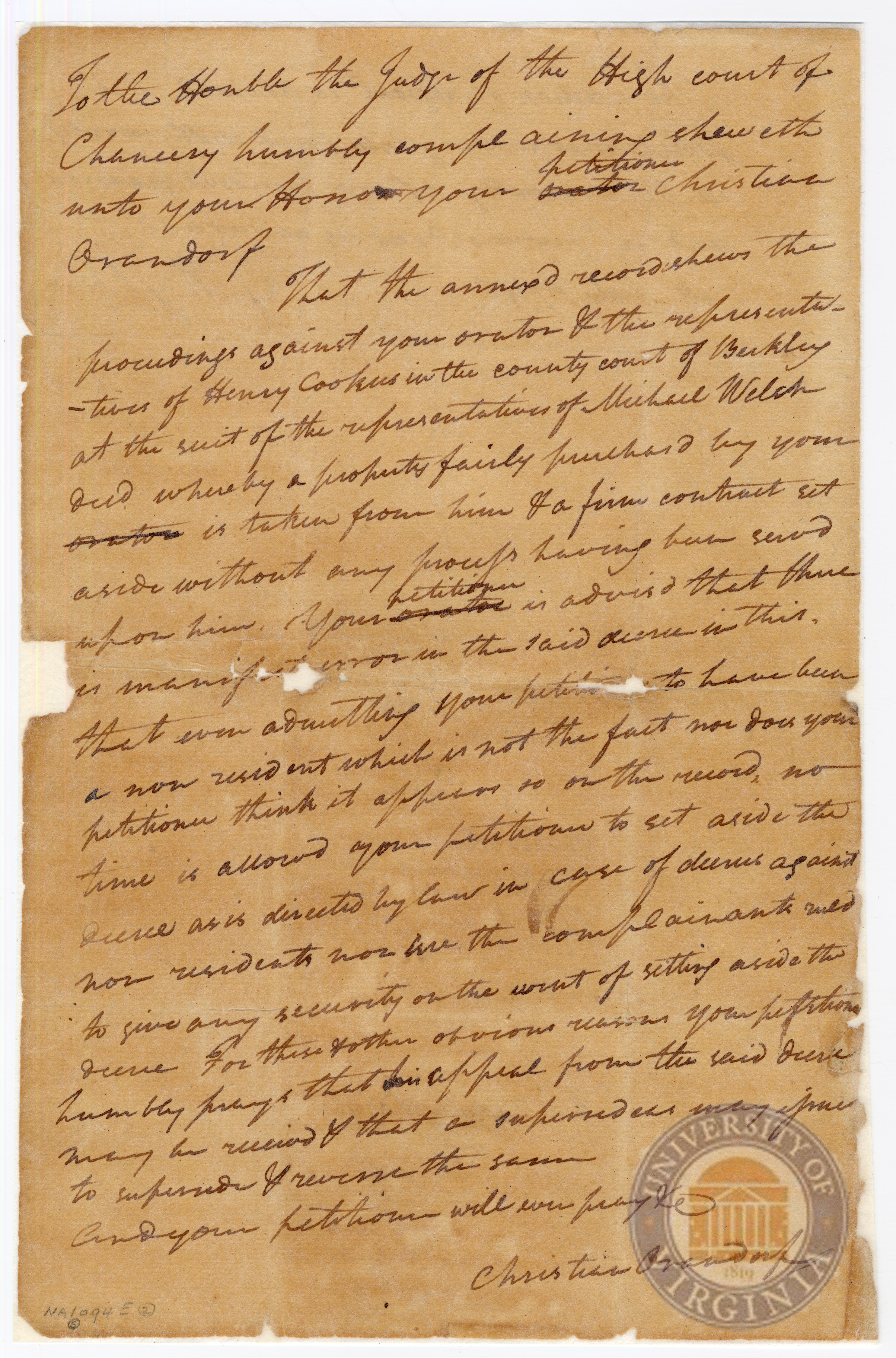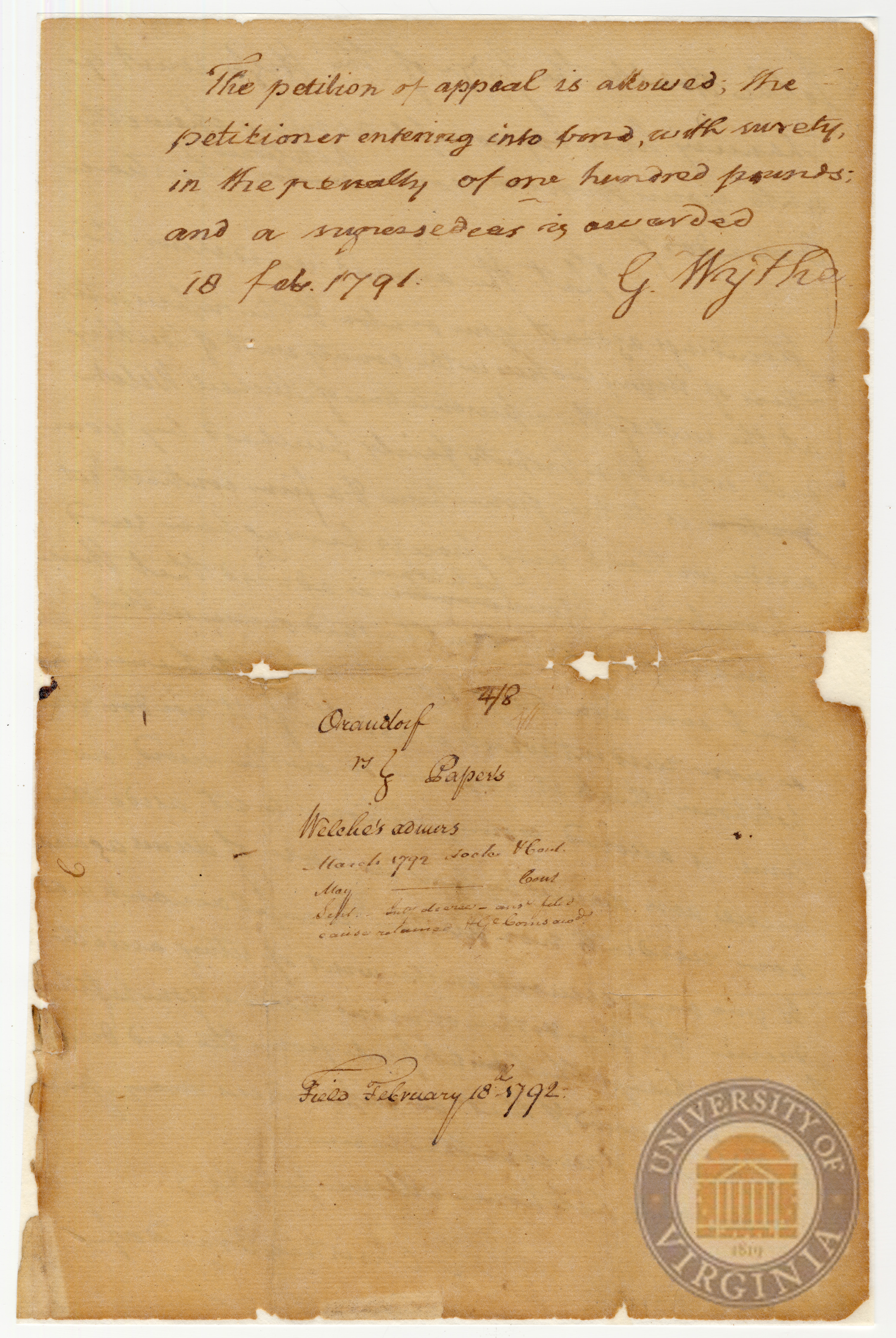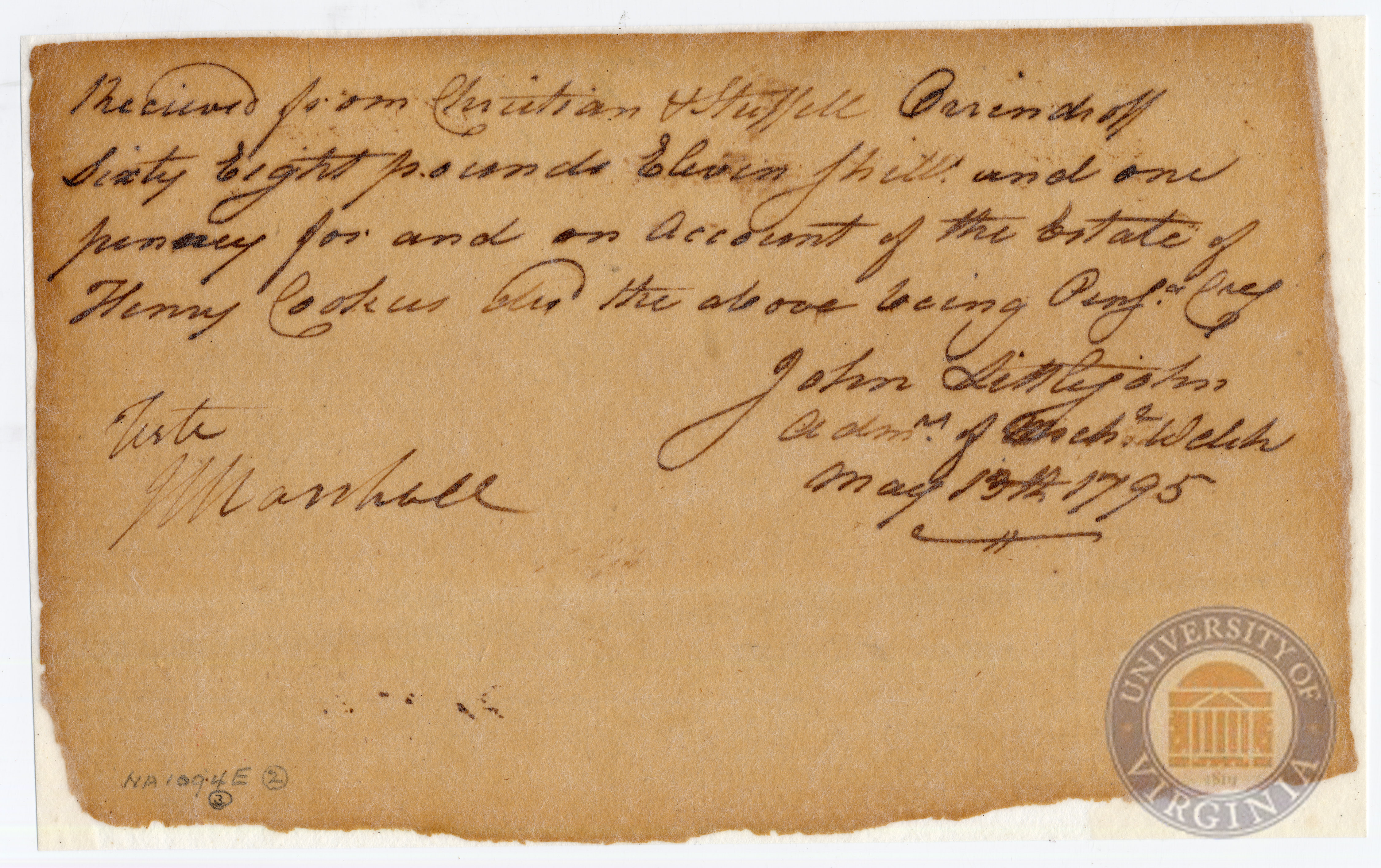Orandorf v. Welch



Orandorf v. Welch (February 18, 1792) is a brief decision by Wythe as Judge of the Hight Court of Chancery granting Orandorf's Petition of Appeal and awarding the petitioner a supersedeas bond.[1] Orandorf's Petition of Appeal is written in John Marshall's hand and was filed on Orandorf's behalf by Marshall in the High Court of Chancery in 1792.[2]
Contents
Background
The representatives of Michael Welch's estate sued Orandorf and the representatives of Henry Cookus in Berkeley County Court. A decree from the court had set aside Orandorf’s purchase contract for property in Berkeley County, and Orandorf's petition alleged the property had been purchased fairly and his firm contract set aside without notice.
Orandorf's petition alleged manifest error in the court’s decree and argued that even if Orandorf had not been a resident of Berkeley County -- which Orandorf insisted was untrue — Orandorf had had no time to set aside the decree, as allowed by the law in the cases of decrees against non-residents. Additionally, Welch had offered no security in the absence of an opportunity to set aside the decree.
Orandorf petitioned for an appeal from the decree to the High Court of Chancery and asked the Court to issue a supersedeas bond to reverse and supersede enforcement of the decree.
The Court's Decision
With minimal discussion, Wythe granted the petition of appeal and awarded Orandorf a supersedeas bond, with surety, in the penalty of £100. According to the court clerk's handwritten notes, the case was subsequently continued until September 1792, when Welch's representatives filed an answer and were awarded a general commission to take testimony.[3]
Additional Information
According to John Marshall's Account Books, Marshall received four separate payments from 1790-1795 for his representation of Christian Orandorf in this matter. The first payment of £5 is listed as having been received on May 21, 1790,[4] suggesting that Marshall may have represented Orandorf in the Berkeley County Clerk. After filing Orandorf's Petition of Appeal in 1792, Marshall received a payment of £6.[5] Marshall's Account Book for 1795 indicate that Marshall received two payments related to this matter that year, first in March 1795 for £3[6] and next in May 1795 for £30.[7] This final payment was received around the time that Marshall witnessed a receipt dated May 13, 1795, indicating that Christian and Stuffell Orandorf had paid the administrator of Welch's estate, John Littlejohn, £66 11s. 1d. This receipt suggests that Orandorf lost his case against Welch on appeal.
Document text, 1792-1795
Page 1 (Orandorf's petition of appeal, by John Marshall)
To the Honble the Judge of the High court of Chancery humbly complaining sheweth unto your Honor your
oratorpetitioner christian OrandorfThat the annexed record shews the proceedings against your orator & the representa-tives of Henry Cookus in the county court of Berkley at the suit of the representatives of Michael Welch and whereby a property fairly purchased by your
oratoris taken from him & a firm contract set aside without any process having been served upon him. Youroratorpetitioner is advised that there is manifest error in the said decree in this, that even admitting your petitioner to have been a non resident which is not the fact nor does your petitioner think it appears so on the record, no time is allowed your petitioner to set aside the decree as is directed by law in case of decrees against non residents nor are the complainants used to give any security on the want of setting aside the decree. For these & other obvious reasons your petitioner humbly prays that his appeal from the said decree may be received & that a supersedeas may issue to supersede & reverse the same And your petitioner will ever pray &cChristian Orandorf
Page 2 (George Wythe's grant of Orandorf's petition of appeal, 18 February 1792)
The petition of appeal is allowed; the petitioner entering into bond, with surety, in the penalty of one hundred pounds; and a supersedeas is awarded
18 Feb. 1791 [sic] G. Wythe
4/8
Orandorf
vs } Paper's
Welche's admors
March 1792 dock. & Cont.
May — Cont.
Sept. - Entg decree — ans^r filed
cause retained & Ge Coms aw^d
Filed February 18^th 1792
Page 3 (John Littlejohn's receipt of Orandorf's payment, witnessed by John Marshall, 13 May 1795)
Recieved from Christian & Stuffell Orrindroff Sixty Eight pounds Eleven shill. and one penney for and on account of the Estate of Henry Cookus [and?] the above being [Poss^or?] [Cred?]
John Littlejohn
Adm^or of Mich^l Welch
May 13th 1795
Teste
J Marshall
See also
References
- ↑ Petition of Appeal by Christian Orandorf (Feb. 18, 1791) (on file with the Arthur J. Morris Law Library Special Collections, The John M. Woolsey Collection of Legal Documents, Box 1, Documents in the Case of Orandorf v. Welch with signatures of George Wythe and John Marshall), available at http://archives.law.virginia.edu/records/mss/78-6/digital/1114.
- ↑ Orandorf v. Welch's Administrators, Petition of Appeal, in 2 The Papers of John Marshall: Correspondence and Papers, July 1788—December 1795; Account Book, July 1788—December 1795 110 (Charles T. Cullen & Herbert A. Johnson, eds., 1977).
- ↑ Id.
- ↑ Accounts: 1790, Receipts, May 21st, Orendorf v. Cookus, supra note 2, at 393.
- ↑ Accounts: 1792, Receipts, February, Orandorf v Cookus, supra note 2, at 433.
- ↑ Accounts: 1795, Receipts, March, Littlejohn v Cookus (in Orandorf v Cookus), supra note 2, at 487.
- ↑ Accounts: 1795, Receipts, May, Orandorf, supra note 2, at 489.